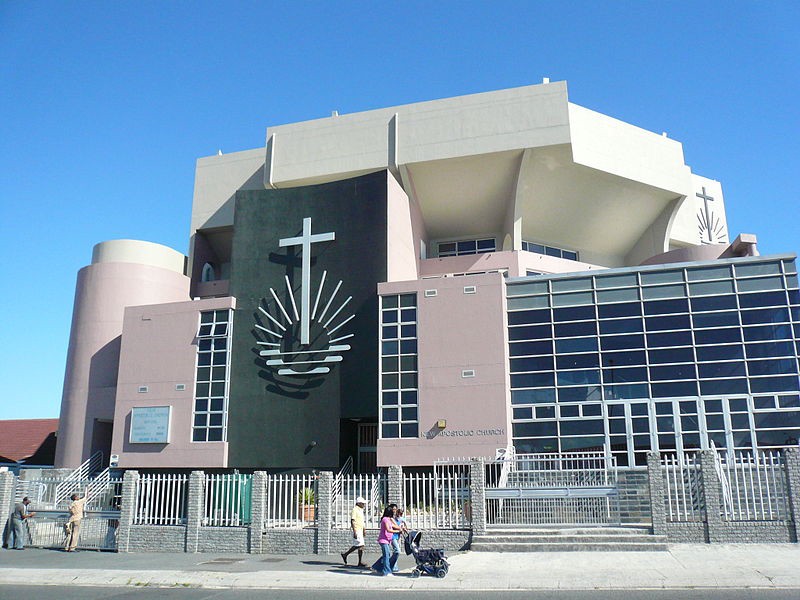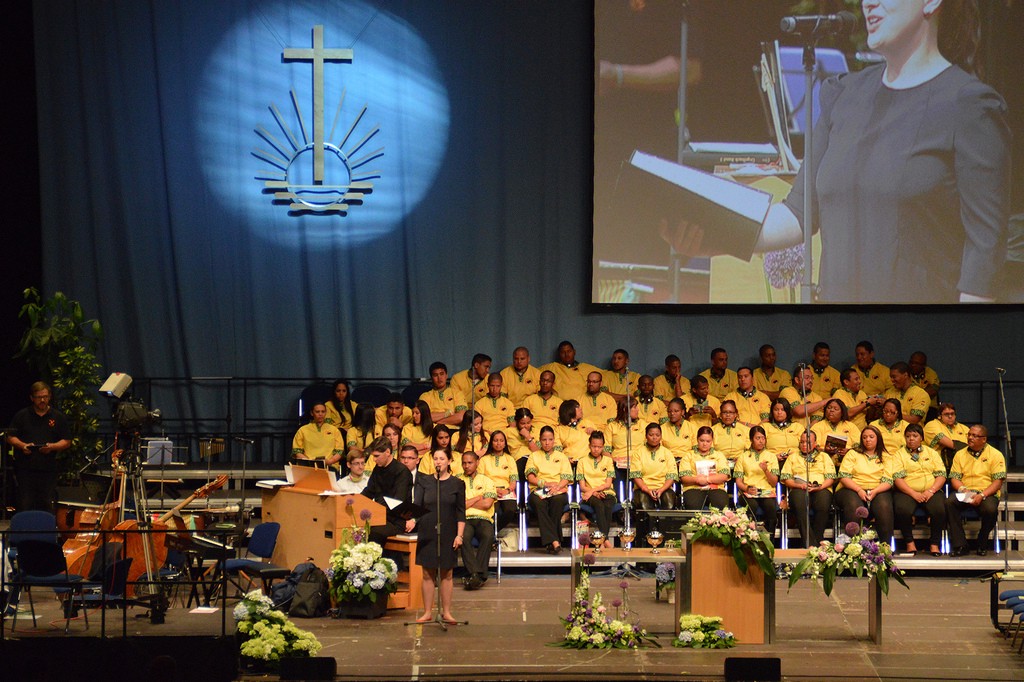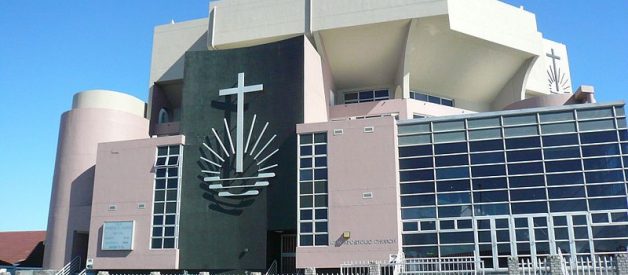 The New Apostolic Church in Cape Town Tafelsig, South Africa, is the biggest representative building in the world
The New Apostolic Church in Cape Town Tafelsig, South Africa, is the biggest representative building in the world
They believe that the Return of Christ and great suffering, as foretold in the Bible, are just around the corner. They have congregations all around the world with nearly 10 million members, and for a long time they would have knocked at your door to give you a taste of their beliefs.
If you feel reminded of Jehova?s Witnesses at that point, bazinga! Although similar in many ways and both being distant childs of Christian Revivalism in the 19th century, this talk is about another group: The New Apostolic Church (NAC).
As someone who followed this church for 18 years, I want to give interested readers a short, intense and factual dive into the beliefs of this hugely unknown group. Solely by consulting their official literature and recent statements, we will try to figure out whether and to what extent these Christian end-time believers can be seen as a cult or not.
In Part 1 of 2, I will outline that:
- The New Apostolic Church considers them inspired by new revelations from God in the 19th century, with the re-establishment of apostles as in the times of Jesus.
- The New Apostolic Church is largely in line with the mainstream Christian idea of reaching salvation but adds the crucial hurdle of being sealed with the Holy Spirit and hence becoming a reborn Child of God.
- The New Apostolic Church considers themselves the only group on earth equipped and authorized to prepare human beings for the Second Coming of Christ, without explicitly excluding others from being accepted by God.
Interested in more discussions about Christianity and cults? Stay tuned through my facebook page!
Question I: Who is the New Apostolic Church?
 Source: Flickr
Source: Flickr
As the name already suggests, the New Apostolic Church consider themselves led by new apostles. For them, being an ?apostle? is not just a reference the circle of Jesus Christ?s 12 closest followers but a call and institution that is indispensable for God?s plans for us humans.
Between 1831 and 1836, a movement called the Irvingians arised in the United Kingdom, who claimed to receive divine calls from the Holy Spirit. By them, God appointed again people as apostles of Jesus, just as St. Peter and Paul were.
The first religious group that came about from this movement was the Catholic Apostolic Church. A split-up from this community in Hamburg (Germany) later in 1863 laid path for the future New Apostolic Church.
Today, the NAC has around 9 million members worldwide and is still the forth largest Christian group in Germany and Switzerland. Moreover, they keep significant hubs in Zambia, the Congo, Kenya and the Cape Town Area.
The main goal of New Apostolic Christians is to go to heaven with Jesus Christ when he will return to earth upon his Second Coming, which they see as promised in the bible:
Then a sign will appear in the sky. And there will be the Son of Man. All nations on earth will weep when they see the Son of Man coming on the clouds of heaven with power and great glory. ? Matthew 24:30 (CEV)
Question II: What is a cult?
Although it is a common term in the Western dialogue about religion, there is no clear definition of a ?sect? or ?cult?. On the contrary, the term is often used as a personal judgement.
A religious group can be understood as a cult if they believe themselves to be the only way to come into eternal life through God. As we can objectively look at claims speaking in favor or against such a view, I will put my focus here.
A more recent approach is the concept of ?high-control groups?. Here a religious cult is characterized by the use of manipulative psychological means to align the the individual with the interests of the cult (i.e. ?brain washing?).
Doubtlessly, there is a significant number of people claiming such experience in the New Apostolic Church. And the church or single leaders themselves have already admitted severe wrongdoings with critical members, for example when dealing with internal disagreement in the past.
However, we cannot read that from current official church literature. As the second approach to identifying cults leaves the dimension of professed beliefs, I leave it to experts of social psychology.
Question III: What is salvation in New Apostolic faith?
As all Christian denominations, the NAC considers salvation ? the state of overcoming all suffering inherent to human existence and attaining eternal life ? achievable through the sacrifice of Jesus Christ.
While evangelical groups emphasize the importance of personal faith in the sacrifice of Jesus, the NAC sides more with the Catholic and Orthodox faith, highlighting the need of God?s legit representatives to prepare human beings for reaching that faith.
Broadly speaking, the tools to get prepared in such a way and to be saved by God are the following:
- The first sacrament, the Holy Baptism with water
- The second sacrament, the Holy Supper ? eating bread and wine in remberance of Jesus Christ?s sacrifice
- The third sacrament, the Holy Sealing or baptism with the Holy Spirit
Moreover, New Apostolic teachings consider the following aspects of recurrent interaction between the believer and the church as essential:
- Hearing the word of God through apostles and their deputies in their sermons
- Receiving the forgiveness of sins through apostles and their deputies as the concluding part of every divine service
I believe that the Lord Jesus rules His church and thereto sent His Apostles, and until His return still sends them, with the commission to teach, to forgive sins in His name, and to baptise with water and Holy Spirit. ? Article 4 of the New Apostolic Creed
Explored individually, most of these steps to salvation are found in other Christian creeds as well in one form or another. However, quite specific to the New Apostolic faith is the primary significance of the first and the third sacrament combined, which amount to spiritual rebirth and becoming a Child of God.
Through Holy Sealing, God grants the baptised the gift of the Holy Spirit. Both sacraments together comprise the rebirth out of water and the Spirit. Through this rebirth, a human being becomes a child of God and is called to be numbered among the firstlings at the return of Christ. ? New Apostolic Catechism, p. 310
Chief Apostle Jean-Luc Schneider, spiritual leader of the New Apostolic Christians, outlines in the following video (minutes 33:37 to 35:50) that only the combination of those sacraments leads to salvation upon the Second Coming of Christ.
Chief Apostle Jean-Luc Schneider, spiritual leader of the NAC, about the necessity of Holy Baptism and Holy Sealing
Question IV: How do New Apostolic Christians expect to find salvation?
According to the New Apostolic Catechism, the state of becoming a Child of God is a necessity for being taken by Jesus on his Second Coming. And exactly this is what, in their eyes, their new apostles are inevitable for!
I believe that those baptised with water must, through an Apostle, receive the gift of the Holy Spirit to attain the childhood in God and thereby the prerequisite for becoming a firstling. ? New Apostolic Creed, Article 8
In the same video (minutes 48:20 to 49:42), Chief Apostle Schneider explains how only the apostles of the NAC have the tools to prepare the ?bride?, the community of all Christians saved upon the Return of Christ
A similar logic applies to the forgiveness of sins, which is not common within Christianity: although it is believed to be an act by God for the remorseful being, it is dependent on the NAC?s apostles and their representatives.
The authority to proclaim the forgiveness of sins in the name of Jesus iscontained in the [?] the Apostle ministry. ? New Apostolic Catechism, p. 412
As a result, the only institution that fully represents God up and until the Second Coming of Christ are the NAC?s apostles.
However, the NAC does not explicitly exclude other believers to be part of those saved upon the Return of Christ:
Those who are numbered to the bride of the Lord will only be revealed atthe return of Christ. One of the identifying characteristics of those who willbelong to the bride is that they wait daily for the return of Christ and consistently cry out: ?Come, Lord Jesus!? [?]. ? New Apostolic Catechism, p. 365
Question V: What about other Christian churches?
No matter how important the NAC officially consider their own apostles, they cannot and do not deny the general relevance of other Christians who still pursue the same or similar salvation tools as defined in Part III.
The New Apostolic Church summarizes their relationship to other Christians as follows:
Thus the church of Christ is not only present where the Apostle ministry is active, that is in the Lord?s work of redemption [i.e. the NAC, author?s note]to prepare the bride. It is also present in other churches where Christian faith is manifest in active love for one?s neighbour, in the clear profession of Jesus Christ, and in the sincere endeavour to follow Christ. This includes those Christian denominations where worship and the praise of the triune God occur in divine service [?]. ? New Apostolic Catechism, p. 275
What does that mean?
The Church of Jesus Christ is the sum of all people who are considered true Christians. They are foreseen to be finally saved by God (read for example page 251). And although New Apostolics believe that this crowd is ?invisible? (i.e. known only to God), they clearly acknowledge that it is not exclusive to the NAC.
On the other hand, they sharply distinguish between themselves and other true Christians. Again, the apostles of the NAC are the crucial matter: Only they are commissioned and equipped by God to prepare Christians for the Second Coming of Christ.
The first springs of inter-religious connections of the NAC (aka ecumenism), which can be found on several continents, has no formal mention in the catechism of the Church.
Question VI: What is with people after the Second Coming?
If New Apostolic Christians are serious about the Church of Jesus Christ (see previous part), then they should see a future with God for other Christians at least after the Second Coming of Christ.
This is indeed the case! New Apostolic Christians see the Second Coming of Christ as only one incident in a longer series of expected future events, including the Great Tribulation and the reign of the Antichrist on earth. Final salvation, however, stands at the end of human history, at the creation of a new world (foreseen in the Revelations of John, the last book in the New Testament).
The question who will access the new world will be answered in a ?Last Judgement? of Christ over every human being. Those who belong to the Church of Jesus Christ, the community of true Christians, can find grace there and be finally saved:
The deciding factor in the verdict pronounced on each human being willbe the attitude that he ultimately adopts toward Christ.[?] Those who find grace in the Last Judgement will become inhabitants of God?s new creation and will be permitted to have eternal fellowship with Him. ? New Apostolic Catechism, p.370
Those who were saved at the Second Coming of Christ (i.e. New Apostolics in the first place) and martyrs of Christianity ? including non-New Apostolics as well ? will not have to go through that judgement but are already saved.
Question VII: Does New Apostolic Theology anyhow exclude people from its services?
This is a sensitive question, as many critics of the NAC see a strong contrast between theory and reality in that regard.
Beyond doubt though is that the church has removed exclusive structures from the past. The most significant example might be Hans Urwyler, the Chief Apostle from 1978 to 1988, who abolished exclusions from participating in the Holy Communion. Before him, it was common to exclude gays, adulterers or other ?sinful beings?.
Nevertheless, some remnants have remained on hard paper. For example, people who left the church are formally not allowed to participate in the Holy Communion (Catechism, p. 337). Likewise, members who participate in the Holy Communion of other Christian Churches are ?warned?:
New Apostolic Christians should bear in mind that by regularly partakingin the Communion celebration of another church they are in principleprofessing that church?s doctrine. ? New Apostolic Catechism, p. 337
Beyond that, the New Apostolic has ? at least in official church theology ? no formal justification of excluding critics or former members from events or personal life. This is definitely found in contrast to the Jehovah?s Witnesses ?disfellowshipping? or Scientology?s ?disconnection? official policies.
Also, there is also no applicable process by which Church followers must be excluded or excommunicated from the NAC. Excommunication, however, does exist.
Question VIII: How Should You Face a New Apostolic Christian?
As someone who was member of the New Apostolic Church for the first 18 years of my life, it is a difficult task to factually assess whether this religion should be considered a cult.
What I can say about me and other people that are still New Apostolic, though, is that many people do their judgement before asking what a particular individual actually believes. And I can assure you: most cult members don?t consider themselves being part of a group that excludes others from salvation. This makes the ?cult? label so counter-productive to discuss.
Debating about cults leads into a dilemma between the official statements of a religion?s leadership and the individual views of its members. Given that these are openly and provably not the same, makes the New Apostolic Church already very different from high control groups such as Jehova?s Witnesses or Scientology.
No doubt, the New Apostolic Church sees their apostle call as indespensable for the very existence of true Christianity on earth until Jesus Christ will return. This can be regarded a cultist trait, as it presents the own church as a channel to community with God and makes the own beliefs exclusive among other Christian creeds.
Apart from acknowledging God?s presence in other Christian groups, however, this self-perception is in many ways close to the official doctrine of the Roman Catholic Church, according to cult observers of mainstream churches in Europe.
After all, everyone should carefully distinguish between the personal beliefs of an individual and the official doctrines and policies of church leadership. Religion is a private matter, and so is often the character of acting cult-like. Every Christian should keep that in mind, especially with regard to her or his own Holy Scripture
I am the way, the truth, and the life!? Jesus answered. ?Without me, no one can go to the Father. ? John? ?14:6? ?(CEV)


